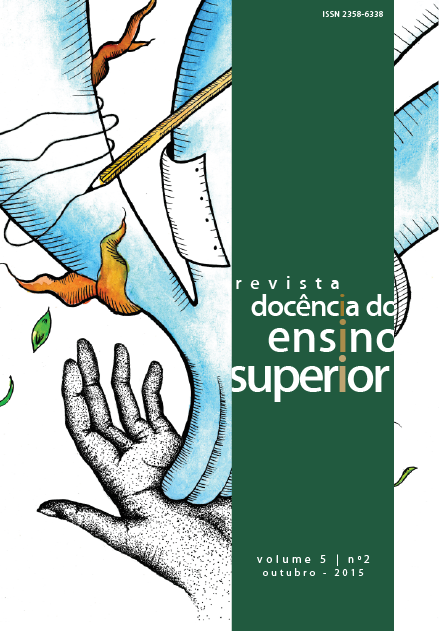Training of teachers and preceptors in the context of curricular innovation
DOI:
https://doi.org/10.35699/2237-5864.2015.2052Keywords:
Education, Problem based learning, HealthAbstract
Experience report on the development of a blended learning model course offered by the Federal University of Rio de Janeiro: “Health Professionals’ Trainers’ Teaching Training: a preceptorship of medical internship in question”. Aiming at a better qualification of medical training and the implementation of an active pedagogical strategy used with health professionals’ trainers for SUS, the course uses Problem Based Learning (PBL) as a method, and the support of a virtual platform of its own. Participants evaluated the use of this interactive method as more effective, because the strategies of active research, group work and discussions in online forums were particularly motivating for the acquisition of skills required to study and answer the leading questions during the learning process provided by the four modules of the course as well for making changes in their practices.
Downloads
References
BOTTI, S. H. O.; REGO, S. T. A. Docente-clínico: o complexo papel do preceptor na residência medica. PHYSIS - Revista de Saúde Coletiva, Rio de Janeiro, v. 21, n. 1, p. 65-85, 2011.
BRASIL. Ministério da Saúde. Cadernos RH Saúde. Secretaria de Gestão do Trabalho e da Educação na Saúde – v. 3, n. 1, Brasília: Ministério da Saúde, 2006.
BRASIL. CONSELHO Nacional de Educação. Câmara De Educação Superior. Resolução CNE/CES Nº 4, de 7 de novembro de 2001. Institui Diretrizes Curriculares Nacionais do Curso de Graduação em Medicina.
BRASIL. Conselho Nacional de Educação. Câmara de Educação Superior. Resolução Nº 03, de 20 de junho de 2014. Institui Diretrizes Curriculares Nacionais do Curso de Graduação em Medicina e dá outras providências.
CECCIM, R. B.; FEUERWERKER, L. O quadrilátero da formação para a área da saúde: ensino, gestão, atenção e controle social. PHYSIS – Rev. Saúde Coletiva, v. 14, n. 1, p. 41-65, 2004.
CECCIM, R. B. Educação permanente em saúde: desafio ambicioso e necessário. Interface – Comunic., Saúde, Educ., v. 9, n. 16, p. 161-168, 2005.
CYRINO, E. G.; TORALLES-PEREIRA, M. L. Trabalhando com estratégias de ensino-aprendizado por descoberta na área da saúde: a problematização e a aprendizagem baseada em problema. Rio de Janeiro, Cad. Saúde Pública,v. 20, n. 3, p. 780-788, 2004.
GARCIA, M. A. A. Saber, agir e educar: o ensino-aprendizagem em serviços de Saúde. Interface _ Comunic, Saúde, Educ, v. 5, n. 8, p. 89-100, 2001.
LARROSA, J. B. Notas sobre a experiência e o saber de experiência. Revista Brasileira de Educação, n. 19, 2002.
MERHY, E. E. Um ensaio sobre o médico e suas valises tecnológicas. Contribuições para compreender as reestruturações produtivas do setor Saúde. Interface _ Comunic, Saúde, Educ. (Botucatu), v. 4, n. 6, 2000.
NÓVOA, A. Formação de professores e profissão docente. In: A. Nóvoa (coord.) Os professores e a sua formação. Lisboa: Publicações Dom Quixote/Instituto de Inovação Educacional, 1992. p. 13-33.
RIBEIRO, V. M. B. (organizadora). Formação pedagógica de preceptores do ensino em saúde. Juiz de Fora: Ed. UFJF; 2011.
ROCHA, H. C. Avaliação da prática de preceptoria após formação pedagógica. 2012. 106 f. Dissertação (Mestrado em Educação em Ciências e Saúde) – Núcleo de Tecnologia Educacional para a Saúde, UFRJ, 2012.
Downloads
Published
Issue
Section
License
Authors who publish in this journal retain the copyright and grant the journal the right of first publication, with the work simultaneously licensed under the Creative Commons Attribution License which allows the sharing of work with acknowledgment of authorship and initial publication in this journal.
Authors are authorized to take additional contracts separately, for non-exclusive distribution of the version of the work published in this journal (e.g. publish in institutional repository or as a book chapter), with acknowledgment of authorship and initial publication in this journal.
Open access policy:
Revista Docência do Ensino Superior is an Open Access journal, which means that all content is available free of charge, at no cost to the user or their institution. Users may read, download, copy, distribute, print, search, or link to the full texts of the articles, or use them for any other legal purpose, without seeking prior permission from the publisher or author, provided they respect the license to use the Creative Commons used by the journal. This definition of open access is in line with the Budapest Open Access Initiative (BOAI).



























